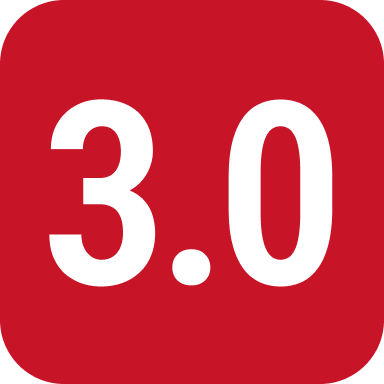Identifying personal weaknesses can be a challenging task. It involves rethinking unpleasant experiences and having to face your imperfections.
This can be a daunting idea, but understanding all of your personality traits, even your negative ones will serve you well in the long run. It can improve your personal life by boosting your self-awareness.
It also improves your professional life by helping your professional development journey.

Some believe overcoming weaknesses is impossible. However, this is not the case. With a strong work ethic and a solid plan, you can turn weaknesses into strengths. In this article, we will explain how to do just that.
What are Personal Weaknesses? Defined
Starting a personal or professional development plan can be extremely exciting. And, you might be compelled to immediately start trying to find all your weaknesses.
You should first slow down and understand what personal weakness is in the first place. In general, you can think of weaknesses as the opposite of your character strengths.
Genuine weakness in a certain character trait will hold you back from achieving your goals, or at least make achieving your goals more tough. It could make you more stressed or negative as well.
Sometimes, weaknesses will block you from using your soft skills. For instance, if you have a hard time managing stress but have great communication skills, you might still poorly present a project.
10 Ways How To Identify Personal Weaknesses?
Now that you are aware of what character weaknesses are, you are likely interested in finding your own unique personal drawbacks. This process is one of self-exploration and could be a bit uncomfortable, as it requires you to be honest with yourself.
In general, if you want to find your weaknesses, you should examine some past negative experiences you had at work, or even in your personal life.
Consider what made you struggle in those times. Did you have a hard time with financing due to lack of accounting skills? Maybe in a stressful situation, your lack of interpersonal skills held you back from connecting with a client.
Look over numerous of such negative experiences and try to draw some patterns. Also, consider what held you back from achieving success or which if your personal attributes made success difficult for you.
A few other ways to identify your weaknesses include:
- Taking a strengths test
- Asking family, friends, and coworkers for constructive feedback.
- Finding what makes you feel negative in your daily life.
- Looking over past performance evaluations from your employer.
- Seeking out advice from a coach.
- Journaling your successes and failures.
- Notice the weaknesses of people similar to you, and reflect on whether you might have them as well.
- Think about situations where you feel a lack of confidence at work and ask: “Why do I feel this way?”
- Create a list of strengths and consider what stops you from using them at work.
- Look at why prior relationships might have been unsuccessful.
45 Common Personal Weaknesses
Everyone has a unique list of personal weaknesses. This is why self-exploration is so crucial to finding out your strong and weak qualities.

That being said, some weaknesses are more common than others. Here is a list of weaknesses that are more widespread in the general population:
- Lack of self-awareness.
- Hubris/being overconfident.
- Awkwardness and poor social skills.
- Low self-esteem.
- Incapable of taking risks (even calculated risks).
- Lack of technical skills of experience in your field.
- Being undedicated or disloyal.
- Indecisiveness.
- Impatience, both with others and with your personal goals.
- Tendency to feel stressed often and easily; challenges with managing stress.
- Lack of empathy.
- Inflexibility.
- Impulsivity.
- Perfectionism, to the point it is inefficient.
- Lack of leadership skills or assertiveness.
- Poor time management skills.
- Difficulty with speaking publicly.
- Being too critical of yourself.
- Procrastinating and being inefficient.
- Micromanaging others.
- Being disorganized.
- Giving up too easily/lack of perseverance.
- Being set in your ways/not open-minded
- Having a hard time telling others ‘no.’
- Always, or almost always, avoiding confrontation.
- Being easily distracted.
- Poor writing skills/uncompelling writing.
- Having a hard time accepting or giving criticism.
- Being hot-headed (easy to anger).
- Thinking in the short term and having few long-term goals.
- Not learning from your mistakes and not having a growth mindset.
- Not standing up for what you believe in.
- Constantly feeling hopeless and negative.
- Lack of creativity.
- Having low levels of independence and being needy.
- Lack of teamwork abilities.
- Not paying attention to self-care and neglecting your needs.
- Being incapable of following rules or being overly rebellious.
- Putting blame on others for your own shortcomings instead of being accountable.
- Incapable of working with uncertainties of ambiguity.
- Being unmotivated and simply ‘going through the motions’ without a purpose to the tasks you do.
- Not taking action to improve your own life and the lives of others.
- Being very easily bored.
- Incapable of prioritizing tasks.
- Dwelling on mistakes you made in the past for long periods of time without moving on (living in the past).
The Importance of Identifying Your Personal Weaknesses
At first glance, learning about your drawbacks might seem negative. Some may even think it is not worth their time. However, being aware of your weaknesses has a plethora of benefits.
For instance, identifying your personal weaknesses will allow you to be more self-aware. This can prevent you from becoming overly confident. In addition, it can be immensely helpful when choosing a career, for choosing a career where your weaknesses are used daily may not be a good idea.
Knowing about your weaknesses will also make your self-improvement goals clearer. In contrast, it will give you a greater appreciation for your own strengths and the strengths of others, thus making you a better team player.
While knowing about your weaknesses is great, it is even better if you can turn them into strengths. By turning weaknesses into strengths, you grow as a person.
Doing so allows you to gain new positive attributes while overcoming past negativity. That way, you can become a better employee and a more positive person overall.
Why Are Interviewers Interested in Your Weaknesses?
You might have noticed that one of the most common interview questions centers around your personal weak points. In fact, nearly every interviewer seems to ask ‘What are your weaknesses?’ to candidates.
There is a good reason for this. The interviewer is testing your honesty and self-awareness when asking about your weaknesses. They want to see if you can openly admit your flaws.
If you can, they see you know what to work on. They want to know what steps you have already taken to overcome your weaknesses. This will show you have a growth mindset, which is highly attractive to employers.
They also want to ensure that your weaknesses do not tie into any central tasks in your new potential job. That way, they ensure you have a baseline level of competence and that your weaknesses will not completely block your workplace success.
How Can You Reply to Interview Questions About Your Weaknesses?
Now that you understand why interviewers like inquiring about your weaknesses, you should formulate a sample response to this question.
Consider what you know about your weaknesses. If you are unsure of what your weak traits are, consider taking a personality test or getting some input from friends or family. Revising your prior failures might also be helpful.
Once you have a list of your weaknesses in mind, consider those which you have worked on improving the most. These are the weaknesses you should bring up during the interview.
Ensure that you are honest about your weak aspects. This will make you a sincere employee and a genuine person. However, also highlight you are working on improving your weaknesses to show you have a growth mindset and are proactive.
Examples of Common Weaknesses in the Workplace
Everyone has their own unique drawbacks and positive traits. For instance, some people have a hard time communicating. You could mention that it is tough for you to be clear when communicating if this was your weakness.
If you are having a hard time thinking of your potential weaknesses, consider examining these common workplace weaknesses:
I am overly concerned about minute details.
Being detail-oriented can be a strength in some careers. However, when this trait gets obsessive, it can hold you back from achieving your goals. You may end up spending too much time ‘perfecting’ tasks, which results in you missing out on doing other tasks and feeling stressed.
I have difficulty with overcoming the past.
It is important to recognize where you come from and what you have overcome. But, when these past events start to linger in your mind, they can start to negatively impact your mood and success. They may interfere with your mental health long term and decrease your motivation.
I struggle with telling others ‘no.’
In order to please others, some people may struggle with telling their coworkers or friends ‘no.’ This could lead to them becoming disorganized, not achieving their goals, not prioritizing tasks properly, and/or not having enough time for self-care.
I feel extremely frustrated and become impatient if tasks are not done on time.
Being impatient can become a serious personal weakness if you do not address it properly. Many of the greatest successes that await you will take time and perseverance to achieve. If you let your impatience get in the way, you may miss out on tremendous opportunities and success.
I feel timid often and lack confidence.
There is a significant difference between being overly confident/cocky and having the confidence needed to stay empowered at work.
Individuals who lack confidence may be unaware of their skills, or simply too scared to appear overly confident when describing their skills. Regardless, it is important to recognize your skills and be an advocate for yourself, which is why a lack of confidence is a weakness.
I struggle with having to ask others for assistance.
No one can do everything themselves. Having the strength to reach out to others is crucial for your mental wellbeing and long-term career success. Without ever reaching out to others, you risk feeling isolated and even increase risk of serious mental illness like depression.
How Research Shows the Importance of Personal Strengths
Acknowledging your personal strengths has a plethora of benefits. In fact, these prodding benefits have even been validated by numerous studies and by world-renowned scientists.
For instance, research done by Dr. Claudia Harzer and Dr. Willibald Ruch found that those who recognize their strengths perform better at work. They are more productive, better team players, stay motivated for longer, and are generally more committed to their work (1).
In addition to this, strengths are also crucial for maintaining great mental as well as physical health. In a study performed by Dr. Carmel Proctor, Dr. John Maltby, and Dr. Alex Linley, strengths were found to significantly improve well-being (2).
Even more, research proves that strengths are necessary for improving motivation, positivity, and happiness (3). Research done by world-recognized positive psychology specialist Dr. Martin Seligman recognizes these trends as well (4).
In short, it is truly crucial to recognize and improve your strengths. Doing so has a wide breadth of benefits, ranging from physical health improvements to more career success.
Strategies for Turning Your Weaknesses Into Strengths
Knowing about your strengths and weaknesses is important. However, it is even more impressive and beneficial if you can turn your weaknesses into strengths.
This process undoubtedly takes time and effort, but you will be rewarded in the long run.
You can begin the process of weakness transformation by recognizing your current weaknesses. Try asking your coworkers, friends, or bosses for input if you are not sure what they are. You could also take a personality test.
There are a few other strategies you could use to turn your drawbacks into strengths. For instance, you could reflect on your mistakes and find ways to use your strengths together with your weaknesses. You could even hire a strengths coach to help you.
You can look forward to more productivity, greater positivity, relationship improvements, and a brighter future in general by following these strategies.
FAQ About Weaknesses
What is your weakness best answer?
Everyone has their own unique weaknesses. Therefore, there is no one correct answer to this question. It is best to be honest and forthcoming to the interviewer when replying, though. Doing so shows your self-awareness and accountability.
Try to choose a personal weakness you have worked to improve. This shows you have a growth mindset and is appealing to employers. Also, ensure the weakness you chose to talk about is not listed as a required strength in the job description.
What are some employee strengths and weaknesses?
To find your individual employee strengths and weaknesses, consider taking a personality test such as the MBTI. Strengths are the qualities that allow individuals to excel in their work, while weaknesses hold them back for achieving their potential.
Examples of employee strengths include empathy, leadership, communication skills, decision-making, organization, time management, and technical skills.
Employee weaknesses include impulsivity, being inflexible, lack of interpersonal abilities, short-term thinking, and indecisiveness, among others.
What are common weaknesses for college students?
College students are a diverse group of individuals with their own distinct personalities and weaknesses. Some weaknesses are more common than others in this population.
These common weaknesses include impulsivity, indecisiveness, lack of experience, lack of leadership skills, not having a long-term vision and poor communication skills.
Conclusion
In conclusion, learning about your personal strengths and weaknesses is absolutely crucial. It will greatly benefit your career and personal relationships. You will become more positive, motivated, and successful overall. Your mental and physical wellbeing will improve as well.
Do not fall into the trap of thinking your weaknesses are permanent. With time and effort, you can turn nearly any weakness into a strength. If you can do this, your entire future will be brightened.
Sources:
- https://psycnet.apa.org/record/2013-22230-014
- https://psycnet.apa.org/record/2011-02166-009
- https://psycnet.apa.org/record/2007-19806-004
- https://psycnet.apa.org/record/2004-20501-001
- https://high5test.com/identifying-personal-weaknesses/
- https://mystrengthsandweaknesses.com/list-of-weaknesses-examples-of-personal-weaknesses/
- https://www.wikihow.com/Identify-Your-Strengths-and-Weaknesses
- https://articles.bplans.com/how-to-identify-your-strengths-and-weaknesses/
